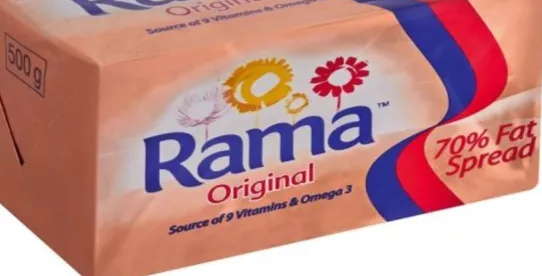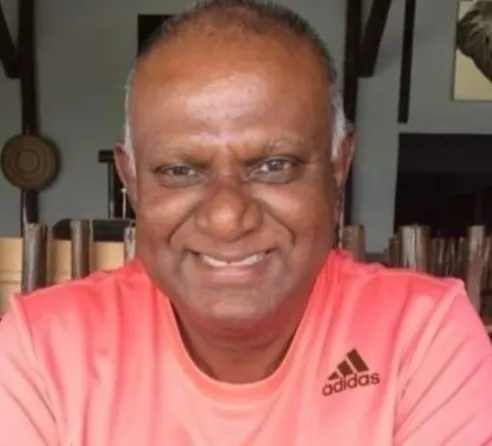Quarter Rama and No Crown
Durban Indian

Reflections on Rama margarine.
Image: Facebook
I REMEMBER ordering quarter Rama and half brown at Narsai's Tea Room. Rama remains a popular brand of margarine, and brown bread came in either the sandwich loaf or the high loaf. My brand conscious mother insisted on BB with Blue Ribbon as a second choice but never Bhagats. She had it in her head that they bred vermin there.
"A quarter" meant a quarter pound, even though by the 1970s South Africa had already shifted to the metric system, leaving Imperial measurements behind.
Bakeries were obliged by law to standardise loaves at 800g. People in Chatsworth swore the high loaf gave you more bread. Its towering shape, however, was a nightmare to fit into a standard lunchbox - unless your lunch was artfully wrapped in wax paper, a common sight back then. Some of our neighbours migrated the expression "tying lunch" from old versions of Hindustani dialects.
It was not usual to have your lunch wrapped in an old copy of the POST either. The newspaper absorbed the oil that squeezed its way out of Monday's regulation green beans or yellow potato filling. If you were bored with your lunch, you could read the paper.
There used to be a little joke in the years after 1975 when television first came to Chatsworth that some people were related to the Ewings of Dallas because they used so much oil in their cooking. Since most people in Chatsworth were Hindus keeping a meat-free fast on Mondays, school or work lunches were vegetarian. If you had a working mother in a rush to catch the Royals bus to the clothing factory in Mobeni your lunch could have ridges like the Drakensberg from the uneven cubes of potato pressed up against the fresh slices.
Better off people took cheese on Monday. Narsai sold cheese in little slabs for 25c and 50c as I recall. Match that against a whole loaf of brown at 8c. If you had the humble braised cabbage with red chillies with its flatulent aroma, you might have cast a jealous eye at the cheese with fat slices of tomato and crispy lettuce. In the 2000s when kwaito was all the rage, I was amused at the language of "cheese boys" coming out of Joburg townships to describe rich kids.
If things were tough at home and you didn't have the privilege of taking lunch, your saviour was the sungum. The public spirited men and women at the Saiva Sithantha Sungum Universal Mission on Road 312 collected donations to voluntarily make mountains of sandwiches for the poor. Fifty years later, the practice is still in place with a number of other religious and community organisations following the sungum's pioneering example.
Just before the ten o'clock tea break, a teacher who owned a car would drive to the sungum hall to fetch a round plastic dish of sandwiches and return the colourful container from the day before. Goodness me, those sungum lunches were tasty! One had to discreetly queue outside the staff room to collect two slices usually with peanut butter.
At one Chatsworth school, a teacher hatched the bright idea of leaving a cardboard box in the middle of the playing field. Kids who didn't want their lunch could pop it into the box. If you didn't have lunch, your shoes became concrete as you trudged the long walk to the middle of the ground under the gaze of judgemental schoolmates.
Narsai's sat snugly in the Westcliff shopping centre, nestled among a warren of small shops. There was Ebrahim’s butchery, where the buzz of the band saws mingled with the playful vulgarity of the blockmen; P. Lalla’s dry goods store, stacked to the rafters with sacks of rice and spices; and Adam’s barbershop, where one could catch up with horse racing tips and mark a place accumulator. Narsai’s, despite its name, served everything but tea.
The name harked back to India, where tea stalls doubled as general stores, stocking daily essentials. My cousin worked there during his high school years even on the days he wrote his matric exams. My granny “fixed” the job with old man Narsai. He was always pottering in the back in a sleeveless knitted cardigan bought during the war, while his son, Bhai, minded the till.
Not every coin went into the register. A rusty tin on the counter behind the glass display case, brimming with sweets, collected the loose change. The case itself was a child’s paradise: strings of liquorice, Joysticks, Chappies bubblegum, Wilson's toffees and those hard balls in black or red. Fancier types could opt for tiny tubes of Kilty's or gum in the upscale Beechies brand.
Narsai had two daughters. One was a Hema Malini look alike while the other was Cinderella's sister. "Baniya" girls were usually out of the reach of us rough township types. I suspect that Boxer's laaitie might have charmed one or both of them. Ebrahim next door was sweet on the boy.
Growing up in Chatsworth, I developed a keen ear for the lingering Imperial terms. Even with the rand in circulation, some folks still called 10c a shilling, 25c “two and six,” or 50c “half a crown.” These phrases weren’t just nostalgia, they were currency in the gambling dens where I was quite popular.
Once when the police raided Corky's shebeen doubling as a gambling school, I dashed up the stairs, tore off my clothes and climbed under the gudhree with Boiled Egg's wife. When the police pulled aside the sari curtain in the doorway to look for the scattering gamblers I admonished them with: "Can't a man sleep in peace with his wife?" The sergeant apologised. Those short on cash or who had lost their money in the gambling school would lament, “I got no crown.”
As my mother's "golden child", I always had money in my pocket and a string of plastic bank cards. She made my cold meat lunch with Choice Butter and even middle slices of white bread. Some days it was viennas with tomato sauce. To this day, it is gospel that if you risk serving me margarine, it will get stuck in my throat.

Kiru Naidoo
Image: File
Kiru Naidoo wrote the memoir, Made in Chatsworth. This story is from his upcoming book. Catch him at the Durban International Book Fair at Eduvos Umhlanga from August 8 to 14. Go to www.madeindurban.co.za for more information.